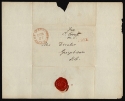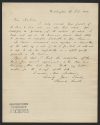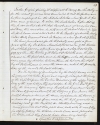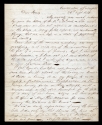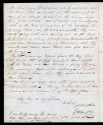The year 2012 marks the 200th anniversary of the start of the War of 1812. That particular war, between the United States and Great Britain, is one of America’s least known wars. While some historians have called it the second war for independence, others have characterized it as an obscure conflict. The items in this exhibition are drawn primarily from manuscripts collections in the Georgetown University Library's Special Collections Research Center. Together, they document fascinating aspects of the War of 1812.
Letter from New York State Assembly to Stephen Decatur, dated March 16, 1813
Autograph Letter, Signed, March 16, 1813. From Daniel D. Thompkins (1774-1825), on behalf of the New York State Assembly and New York State Senate, to Stephen Decatur (1779-1820), commending him and his crew for their bravery in the naval battle between the U.S.S. "United States" and the H.M.S. "Macedonian" during the War of 1812. Stephen Decatur gained widespread praise in America for his naval victory aboard the U.S.S. “United States.” During the war, the U.S. Navy surprised many observers by holding its own against Britain, a world naval power.
From the Stephen and Susan Decatur Papers, Box 1 Folder 11
Letter to Susan Decatur, dated February 26, 1832, regarding her husband's pension
Autograph Letter, signed, February 26, 1832. From Edward Everett (1794-1865), member of the U.S. House of Representatives from Massachusetts (1825-1835), to Susan Decatur, regarding her departed husband’s pension claim before Congress. After Stephen Decatur was killed in a duel in 1820, his wife Susan converted to Catholicism and moved to a cottage in Georgetown next to the Georgetown College campus. She finally received the federal pension in 1837. At that point, when Georgetown College had financial problems, Susan donated a considerable amount of money to help the college survive.
From the Stephen and Susan Decatur Papers, Box 1 Folder 24
Letter from J. Lacey to Charles Lacey, dated January 1, 1814
Autograph Letter, signed, January 1, 1814. From J. Lacey to Charles Lacey, midshipman on board the U.S.S. "Madison" in Sacket's Harbor, New York, with lengthy discussion of the War of 1812. The author compares the lot of land soldiers versus naval men during the war and discusses conditions in New Mills (New Jersey), the embargo, and the prospects of Napoleon Bonaparte. The postscript reports the fall of Fort Niagara to the British and criticizes the American generals leading the war effort. Charles Lacey served in the U.S.S. “Madison” on Lake Ontario during the War of 1812. There were no major battles on Lake Ontario during the war.
From the Charles Lacey Papers, Box 1 Folder 5
Map of Lake Ontario during the War of 1812
The Americans had a shipbuilding base at Sacket’s Harbor, New York while the British shipbuilding facility was at Kingston, Ontario. The bases were only about 30 miles apart by water.
Recollections of Rev. John McElroy, S.J.
During the War of 1812, the British burned the U.S. Capitol and the Executive Mansion on August 24, 1814. Fr. John McElroy, on page 13 of his recollections, recalls that the fire was so bright that he could read after dark at Georgetown College.
From the Maryland Province Archives of the Society of Jesus, Box 10 Folder 1
"Star Spangled Banner" Manuscript
Autograph Manuscript, signed by Francis Scott Key, the “Star Spangled Banner,” dated Washington, D.C., August 29, 1842.
Key wrote this copy of the "Star Spangled Banner" one year before his death. He wrote it to a Mr. Espy. Very few manuscript copies of the national anthem have survived. Key wrote this copy long after he wrote the original song on September 14, 1814.
Gift of the recipient's daughter, Elizabeth McCalmont Espy (Mrs. J. A. Nunn), 1898.
Letter from Joseph Causten to his brother James Causten
Autograph Letter, signed.
Dated September 26, 1814 and praising the Americans who turned back the British attack on Baltimore. Joseph voices his concern that the British may attack Norfolk, Virginia.
Hand-Colored Engraving of Stephen Decatur
Georgetown University Art Collection.
By Alonzo Chappel (1828-1887).
Johnson, Fry & Co. Publishers, New York, 1863.
Exhibition curated by Scott S. Taylor, Manuscripts Processor, Special Collections Research Center





